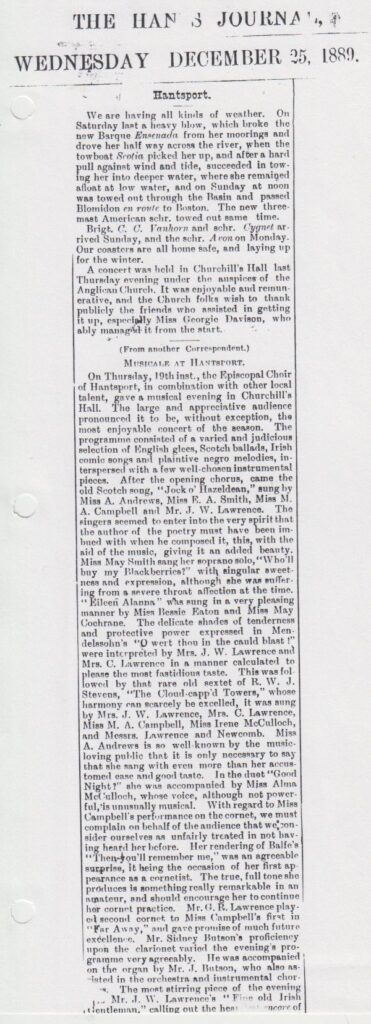THE HANTS JOURNAL
WEDNESDAY DECEMBER 25, 1889.
Hantsport.
——

We are having all kinds of weather. On Saturday last a heavy blow, which broke the new Barque Ensenada from her moorings and drove her half way across the river, when the towboat Scotia picked her up, and after a hard pull against wind and tide, succeeded in towing her into deeper water, where she remained afloat at low water, and on Sunday at noon was towed out through the Basin and passed Blomidon en route to Boston. The new three-mast American schr. towed out same time.
Brigt. C. C. Vanhorn and schr. Cygnet arrived Sunday, and the schr Avon on Monday. Our coasters are all home safe, and laying up for the winter.
A concert was held in Churchill’s Hall last Thursday evening under the auspices of the Anglican Church. It was enjoyable and remunerative, and the Church folks wish to thank publicly the friends who assisted in getting it up, especially Miss Georgie Davison, who ably managed it from the start.
——
(From another Correspondent.)
MUSICALE AT HANTSPORT.
On Thursday, 19th inst., the Episcopal Choir of Hantsport, in combination with other local talent, gave a musical evening in Churchill’s Hall. The large and appreciative audience pronounced it to be, without exception, the most enjoyable concert of the season. The programme consisted of a varied and judicious selection of English glees, Scotch ballads, Irish comic songs and plaintive negro melodies, interspersed with a few well-chosen instrumental pieces. After the opening chorus, came the old Scotch song, “Jock o’ Hazeldean,” sung by Miss A. Andrews, Miss F. A. Smith, Miss M. A. Campbell and Mr. J. W. Lawrence. The singers seemed to enter into the very spirit that the author of the poetry must have been imbued with when he composed it, this, with the aid of the music, giving it an added beauty.
Miss May Smith sang her soprano solo, “Who’ll buy my Blackberries?” with singular sweetness and expression, although she was suffering from a severe throat affection at the time.
“Eileen Alanna” was sung in a very pleasing manner by Miss Bessie Eaton and Miss May Cochrane. The delicate shades of tenderness and protective power expressed in Mendelssohn’s “O wert thou in the cauld blast !” were interpreted by Mrs. J. W. Lawrence and Mrs. C. Lawrence in a manner calculated to please the most fastidious taste.
This was followed by that rare old sextet of R. W. J. Stevens, “The Cloud-capp’d Towers,” whose harmony can scarcely be excelled, it was sung by Mrs. J. W. Lawrence, Mrs. C. Lawrence, Miss M. A. Campbell, Miss Irene McCulloch, and Messrs. Lawrence and Newcomb. Miss A. Andrews is so well-known by the music-loving public that it is only necessary to say that she sang with even more than her accustomed ease and good taste. In the duet “Good Night?” she was accompanied by Miss Alma McCulloch, whose voice, although not powerful, is unusually musical. With regard to Miss Campbell’s performance on the cornet, we must complain on behalf of the audience that we consider ourselves as unfairly treated in not having heard her before. Her rendering of Balfe’s “Then-you’ll remember me,” was an agreeable surprise, it being the occasion of her first appearance as a cornetist. The true, full tone she produces is something really remarkable in an amateur, and should encourage her to continue her cornet practice.
Mr. G. R. Lawrence played second cornet to Miss Campbell’s first in “Far Away,” and gave promise of much future excellence.
Mr. Sidney Butson’s proficiency upon the clarionet varied the evening’s programme very agreeably. He was accompanied on the organ by Mr. J. Butson, who also assisted in the orchestra and instrumental choruses.
The most stirring piece of the evening was Mr. J. W. Lawrence’s “Five old Irish Gentleman,” calling out the hear– encore of ……
